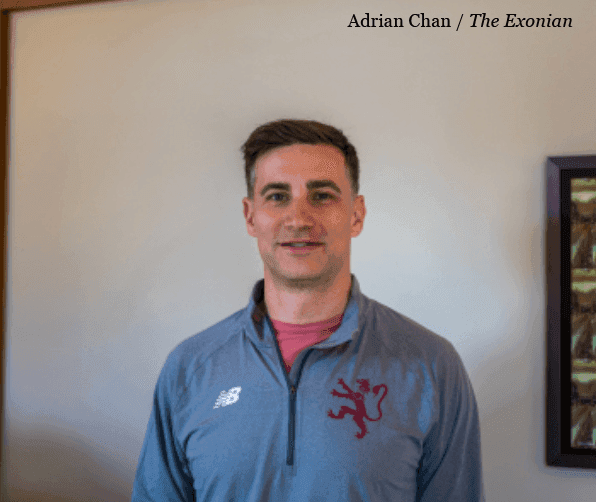By ARYAN AGARWAL, GRACE YANG, and MEGHAN TATE ZEE
On Friday, Feb. 7, following the Student Council’s presidential debate, Phillips Exeter Academy’s 16th principal, Bill K. Rawson, walked onto the stage. The lingering chatter of faculty and students dissecting the heated moments of the debate faltered into uneasy silence. As shoulders stiffened and eyes tracked his every step, the school was held in anticipation — no one knew it yet, but everything was about to change.
“It is with understandably mixed feelings that I have informed the Trustees that I will retire as principal of Phillips Exeter Academy at the end of the next school year.” After delivering this heavy message at the assembly, Rawson also wrote a letter to the Exeter community, alongside a letter from the President of the Trustees, Kristyn Van Ostern.
Rawson has been an integral member of the Academy in various roles. In addition to being the incumbent principal, he graduated as an Exonian in 1971, is a parent of an Exonian from the class of 2008, and served as a trustee from 2004 until 2016. Until retirement, he will continue to serve the Academy in its growth and aid in a thorough search for the 17th principal.
In an interview, Rawson explained his decision to retire: “What was originally a two-year assignment as interim principal has become an eight-year assignment as the school’s sixteenth principal. I feel the time is right for me personally to retire.” Rawson’s tenure has been not just lasting but impactful beyond doubt. Though the community will see him go with regret, Exeter can find warmth in the fact that his time has been and will continue to be worthwhile. It is undeniably bittersweet.
The decision is also for the betterment of the school: “I believe the time is right for the school to transition in leadership. We have made substantial progress towards the priorities I articulated at the end of my first year and are ready to confront new challenges and opportunities.” Over the years, Rawson has handled several of the most significant improvements made to the school.
Dean of Faculty Eimer Page noted that “He [Principal Rawson] was our principal during the pandemic, brought need-blind admission to fruition, helped to develop the buildings, New Hall and Wetherell, got the Davis Library and Academy Building renovation launched, stewarded our Climate Action Plan, and much more.”
On the note of need-blind admissions, Van Ostern expanded in her letter that “the historic transition … [is] an achievement that exemplifies his [Principal Rawson’s] lifelong commitment to non sibi. His leadership, defined by purpose and selflessness, has inspired our community to embrace these values.”
Russell Weatherspoon, former Dean of Students, added, “He accepted the significant burdens that are part of leading the school. These include working with the board of trustees, administrators, and faculty. staff and the students to create a healthy and welcoming learning community.”
Rawson comforted Exeter, believing that this change was well-timed. He said, “The best time for a transition in leadership is when a school is in good health and a strong position, and we are in good health and a strong position now.” In Rawson’s mind, Exeter is heading in the right direction and standing on solid ground — these are the ideal conditions for a change in principal.”
Reminiscing on his tenure at Exeter, Rawson recalled in his letter that “I was warmly welcomed by all members of the Exeter community upon my arrival in July 2018. That warm welcome has had everything to do with the success that we have achieved together.” Rawson has felt dearly connected to this school ever since attending as a student and has grown an even fonder connection with his time as principal. His appreciation for the kindness around him is unwavering, regardless of his role — after retiring, Exeter will only hold an even more special place in his heart.
Rawson’s announcement left Academy members with many emotions. Instructor in Science Tanya Waterman stated, “My reaction to the announcement at Assembly was the same as that of the students: quite surprised, yet grateful for his service to his beloved PEA. The standing ovation said it all.” When a school of such size, with no hesitation, stands in unison for one individual, it speaks volumes to their character.
Upper June Kim added, “The timing of the announcement was interesting because it was right after the presidential debate, and we were all in an excited state. Suddenly, Principal Rawson came on the stage and then announced that he was going to leave. I felt so many different emotions at once, so it was confusing and shocking.”
Page commented, “My reaction is one of gratitude to him, excitement for him to have more time for his family and grandchildren, and anticipation for our community as we embark on the search for our next Principal.” Though his departure will leave us all with a gap, Rawson will leave us with hope and a light at the end of the tunnel.
Lower Sophia Xue said, “He has such a strong presence in the Exeter community and within the students. I’m sad that he won’t be the one giving us our diplomas when we graduate.”
Reflecting on his roles at the Academy, Rawson stated, “I have said many times that attending Exeter as a student transformed my life. Truly, every time I have been a part of this community — as a student, faculty member, alumnus, parent, trustee, and now principal — I have been deeply enriched by the experience beyond anything I could have imagined at the outset.”
From making significant changes in the Exeter community to watching Exonians in their extracurricular competitions, Rawson has not only contributed a great deal to the school but has become an integral part of it himself. Kim stated, “He goes to sports games and joins in on clubs or affinity group meals. He’s tried hard to become a part of the student body and listen to us. He also has a lot of school spirit, especially for EA.” Principal Rawson is a person who first serves the students with an undying passion.
Xue added, “As a member of the architecture club, we had dinner at his house once to discuss our end-of-term project, and he was super welcoming. He prepared food for us, and we just sat down and talked about the club projects.” No matter what, Rawson is never afraid to go to the grass-roots level to connect with Exonians — for him, that’s what being a leader truly is. That will be his legacy.
Weatherspoon commented, “Principal Rawson has gotten to know so many students and other adults by simply engaging them in casual but open conversation. “
“I’ve had the privilege of having many dinners with him because in Democratic lub, we started this tradition of having bipartisan dinners and discussions, and that has been amazing,” senior Aveen Burney added.
Senior Bea Prarie commented on Rawson’s values for the Academy, saying, “Principal Rawson always encourages us to be polite and grateful, especially to the people of the town of Exeter. So a couple of years ago, when he didn’t wave when he crossed the street, he bought the whole school ice cream.”
Burney later stated, “One of my favorite memories is actually before I came to Exeter. I was attending a Zoom and in the chat, I mentioned how we both attended the same school in Long Island. I was so excited when he responded and it’s been something that connects us after all this time.”
Rawson has a substantial presence on campus, consistently cheering for and supporting every sports team and arts event. Instructor in Physical Education Samantha Fahey expressed her gratitude for Rawson’s support, stating, “I’ll never forget it was my first varsity game here, and I didn’t know he was going to be there. I already felt a little pressure, but he welcomed me with open arms.”
Senior Anna Holtz observed, “Principal Rawson genuinely cares about students at Exeter, or else he wouldn’t put in all the effort outside of his basic duties. I feel like he goes far beyond that.”
As the school handles the magnitude of Principal Rawson’s decision to step down, the community hopes to move forward, holding dear the cherished memories created during his tenure. The standing ovation that erupted from the student body during Friday’s assembly was a testament to their deep respect and admiration for him. “[This action] the student body gave to him spoke highly to how he is regarded and the personal connections he has forged with so many individuals on campus,” reflected Page.
Gene Shen ‘72, a Trustee of Phillips Exeter Academy and one of Rawson’s close friends, gave a hopeful look to the future by recollecting his favorite memories. “He truly is a great individual. I’ve loved hanging out at Saltonstall House with him by the fire over a glass of wine and talking about old times and how life at Exeter has transformed all of us. I truly, truly love the guy.” These connections aren’t rare, though — ask anyone on this campus, and they will tell you exactly how Rawson has left a mark on them. That’s because it’s what he does best.
Rawson is a legend of Phillips Exeter Academy in every right. One can go on about his accomplishments during his time here and those that will come in the future — there is no short supply of them. The progress that he has fostered is staggering, but that isn’t what makes him such a unique character. It’s the things beyond his résumé. Apart from his accomplishments, his dedication to principles of non sibi, respect, and compassion has shaped the Exeter experience for generations of Exonians past and still more to come.
Finally, thank you, Principal Rawson, for serving as the 16th principal of our beloved school — we assure you that you will be missed. You inspired confidence in so many of us. We are grateful for your strong words of advice to students: “Believe in yourselves as your teachers, other advisors, and mentors believe in you, and as I believe in you.” Thank you, Principal Rawson.































